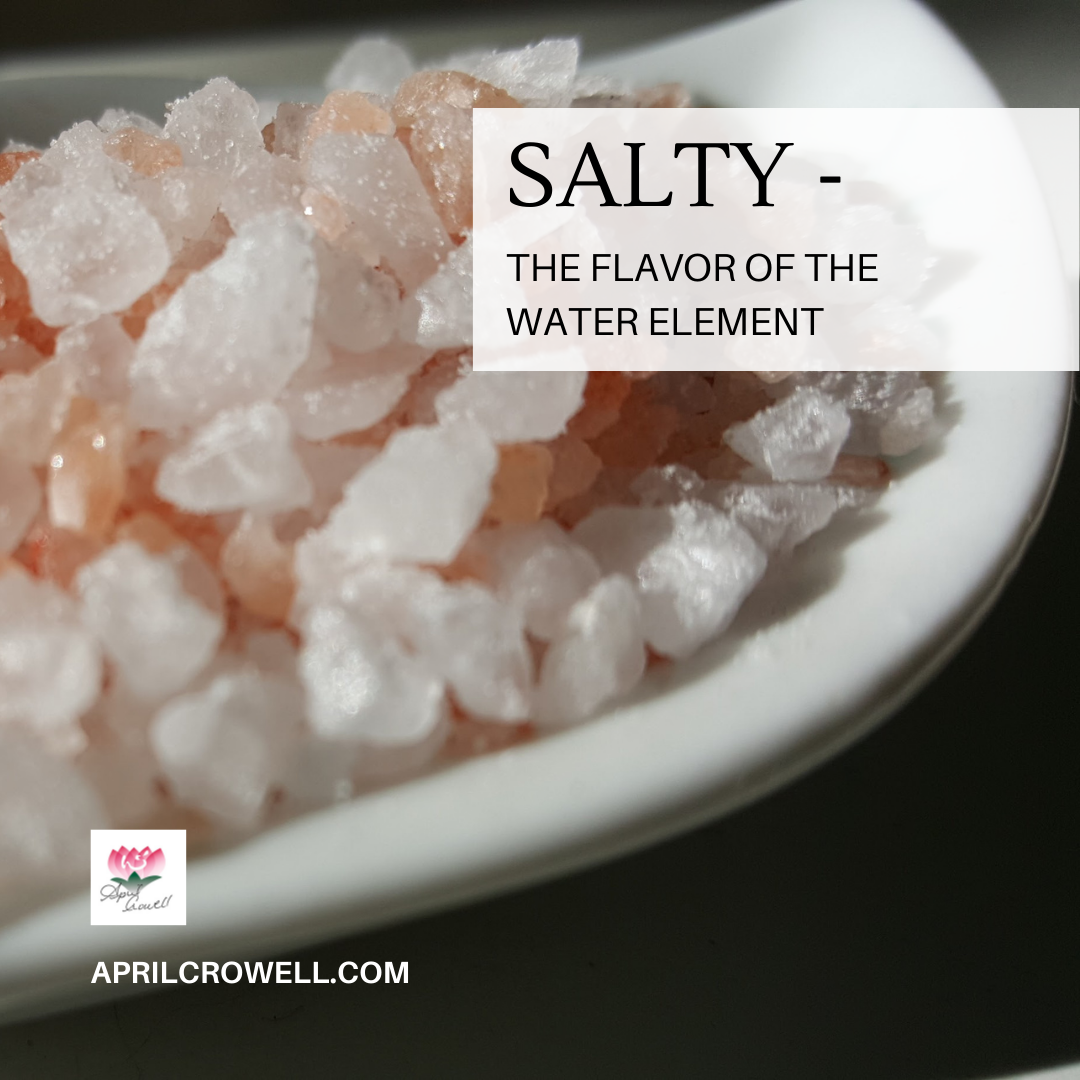Salty - The Flavor Of The Water Element
Take life with a grain of salt. Well…at least sip your water with a grain of salt. The action of the magnesium in the salt helps to pull the water into your cells giving you better hydration. Just a little grain of Celtic or Himalayan sea salt will do.
Salt! You cannot live without it. Too little or too much can be a problem - it’s all about balance.
A vital mineral for life, salt has been a part of our food and lives since time immemorial. For centuries, salt was used as a form of payment. In fact, the word ‘salary’ comes from the tradition of paying Roman soldiers in salt rather than gold, silver or copper. Salt’s history as a medicine is also long and has withstood the test of time. It has been used to treat gas, bloating, abdominal pains and bowel obstructions. Salt water washes are effective at treating skin eruptions, poison ivy and oak and general itching. Salt water is also effective as a gargle for sore throats and bleeding or pus filled gums.
Once precious and difficult to obtain, today salt is readily available in many forms to most of us. Our options are wide with salts ranging in color and flavor from luscious pinks to grays and golds. Too little or too much salt in the diet can create a problem – and sodium and salt are not the same thing – but we will get to that. First, what does the flavor do from an Asian food energetic perspective?
Salt has a cooling thermal nature, moistens Yin and counters dryness
Of the 5 Flavors in Chinese medicine – sweet, sour, bitter & pungent – salt is the only flavor that is also a mineral, which is perfectly apt for the flavor of the Water element. It’s the flavor that corresponds to the Kidneys which are the “root of Yin and Yang” in our bodies. Corresponding to the season of Winter, salt and the salty flavor help to cool the system down whether the heat is caused by seasonal heat or interior friction caused by habituated emotions. Yes, your constant angst, frustration, worry or fear generates heat internally. The salty flavor encourages Yin and fluids to rebuild countering conditions of dryness – partly because an increase in salt in the diet requires an increase of fluid and water intake.
Salt softens, descends and aids digestion
Salt and salty flavors help to regulate water and moisture in the body. Its softening nature is used to dissolve and disperse hard accumulations – like lumps, hard glands, lymph masses, stones and cysts. This includes abdominal masses and bowel obstructions, helping to regulate the bowels and improve digestion. It will soften overly tight and contracted muscles and soften spasms. Salt descends taking the energetics of the foods they accompany deep into the body’s core to root us and give strength and stamina.
Tend to feel unrooted or ungrounded? It’s common, especially for those who may have insufficient salt in their diet. Take a little salt, a few crystals of sea salt will do, and see if you don’t feel more rooted in the matter of minutes. I use this as an experiment in my classes all the time, asking students to take some sort of stimulant at a lunch break – chocolate, coffee or sugar or just to get wound up. Then they take a few grains of a good quality salt – ah…the group settles and calms down within minutes.
Salt counters toxins, alkalizes and balances acidic foods
Salt helps to counteract ingested toxins from food and chemicals. Salt has long been added to lentils, legumes and whole grain, meats and other highly acid foods to help balance their acidic nature. Toxins in the blood and body often appear as skin eruptions which salt can help treat both through ingestion and external application.
Aids the Heart (Fire) and Kidney (Water) connection
Eh? Salt helps to unify the Fire and Water connection in the body. This is the Shen (spirit) of the Heart to the Zhi (will power) of the Kidneys. The proper connection of Fire and Water corresponds to clarity of intention with appropriate action, it creates consciousness and helps you move forward with meaning and clarity in your life. How clear do you feel?
Salty flavors enter the Bladder and Kidney and correspond to Winter and the Water element
The flavor moves inward to the Kidneys and helps us to store strength. The Kidneys are considered the ‘root of life’ because they store our Jing (essence) and are the foundation of Yin and Yang in the body. Their channel systems is one of the first to form as a fetus grows and the body develops. Jing is the essence that we are born with and the blueprint for our constitution. As we go through life we slowly use up Jing until its flickers out and the body dies. How fast we use up our Jing depends on two things: how much you are born with (thank you Mom and Dad) and how fast you burn through it. Jing is easily depleted by excessive living behaviors like use of drugs, irregular eating habits, overeating, and over exercising – you know, living hard. Major or frequent illnesses and injury also quickly deplete the Jing. The Kidneys also rule the bones, the teeth and the marrow. So keeping them strong is a must. The Kidneys are easily damaged by cold and fear.
Aids in recovery from Yang collapse
You’ve burnt the candle at both ends or had a serious illness and now you are chronically tired and weak. This is Yang collapse and it takes time to recover from. Salt’s anchoring nature builds strength deep within the body and essential for conditions of Yang collapse in the correct amounts.
Salt marries flavors
One of the tricks to knowing how to cook is knowing what the flavors do. Sour flavors add vibrancy to a recipe, fats satiate and comfort, salt marries the flavors in a dish. In other words if all the flavors hit your tongue at different times, add a wee bit of salt, taste again and see if the flavors start to marry. If you accidentally over salt a soup add a potato, that just love to slurp up the excess salt, you can pull the potato out of the soup after about 30 minutes or just make it a part of the recipe if that works.
Too little salt
Who has too little Salt in their diet? Those who have salt/sodium restricted diets or those who eat infrequently or never salt their own food. Too little salt and we will feel ungrounded, having little connection to our being, we will lack Qi (energy), strength, will power and vitality. Other symptoms include: lack of strength and sex drive, intestinal gas, vomiting, and muscle atrophy. Sweating will naturally deplete salt, be sure to replace it with food and drinks high in potassium and moderate salt.
Too much salt
When we have too much salt the bones become weary, there might be edema or swelling and the muscles become weak. The mind can become despondent and the person will lack drive and motivation. Even in western medicine it is recognized that high levels of sodium in the body will increase the blood pressure (hypertension) and kidney and heart diseases. Signs of excess salt include: high blood pressure, ulcers, cancer of the stomach, fear, cravings, Kidney diseases, diminished mineral and calcium absorption, excessive thirst, dark urine, darkened complexion, clenched teeth, and bloodshot eyes.
Salt cravings
Craving salt may mean that you need salt…or it is often an indicator of other patterns in the body. These include:
The use of low quality or refined salt will lead to a lack of minerals in the body and can create cravings.
Too acidic of blood from heavily processed foods or medical treatments like chemo and radiation will deplete minerals and lead to cravings.
Living in a fearful or chaotic environment will damage the Water element and lead to depleted minerals which help to anchor the mind.
Having a weak digestive system and lack of hydrochloric acid in the stomach. Tip here – eat more fermented foods that will have live enzymes – Hello, kimchi and sauerkraut.
Eating too many spicy, hot, rich foods or too stimulating of foods like alcohol, coffee, chocolate and sugar.
Na-Sodium – where there is salt and the salty flavor there is sodium
To speak of salt and the salty flavor we must discuss sodium. Because sodium is an essential mineral, we need to take a look at sodium from a western quantitative perspective. As the primary positive ion in our blood and fluids, sodium is everywhere in the body. Historically, when our diets were less processed we used to get in about 1 gram of sodium a day – no high blood pressure there. Now, the average person is consuming nearly 12 grams of sodium a day. To be clear, salt itself is 60% chloride and 40% sodium. That means 5 grams of salt equals about 2 grams of sodium. In short, we need only about 5 grams of salt a day. Make it a good form of salt such as sea salt.
Potassium is essential for proper sodium balance in the body. If either is in excess it will deplete the other – in the American diet, we are usually over using sodium. To help balance the sodium potassium relationship make sure your diet is high in potassium rich foods: including legumes, lentils, whole grains, leafy green, figs, yams and amasake. Often eating potassium rich foods will quell salty cravings quickly.
High salt and sodium foods to watch out for
Salt and sodium have long been used to preserve foods. As a culture that eats many processed foods, it is not surprising that American’s sodium intake has skyrocketed over the years. This has contributed to food based diseases like gout, edema, hypertension and high blood pressure.
Foods notoriously high in sodium include: smoked and salted meat, deli meats, hot dogs, sausage, MSG laden foods, brine soaked foods, some fermented foods, canned soups and vegetables, processed cheese, pickled foods, condiments (catsup, salad dressings, steak sauce, etc.), snack foods (chips, pretzels) and soda or any drinks with sodium phosphate added.
But wait, April, naturally fermented foods are popular again…are you telling me to cut them out? No, please eat natural ferments, but eat a variety and those processed with high quality salts and even those without. It’s the refined salts and the commercially processed foods that are the problem. Cut back processed foods and gently season your own foods with a high quality salt.
Olives and mozzarella
Where can you find salt and the salty flavor?
Well, salt of course – and if you are still using processed table salt, put it in your cupboard for emergencies like kitchen fires or to make salt scrubs or playdough….don’t eat it. Minerals (part of the Metal element) are essential to enliven the Water element. Move instead to a quality sea salt that still has minerals and hasn’t been bleached and processed. I am partial to Celtic Sea salts which are mineral dense.
Kelp, kombu, nori, agar agar. Okay, all seaweeds – that’s as Water element as you can get. Did you know that nearly all of the minerals and trace minerals that make up our blood are in the ocean? In fact, a cup of seaweed has about 71 mgs. of sodium and nearly all trace minerals that the body needs. Seaweed salad anyone?
Brined foods: Olives, pickles and brined meats
Ferments and pickled foods: Umeboshi plum, tamari sauce, soy sauces, sauerkraut, kimchi, miso and pickles
Alfalfa sprouts
Barley
Beets and their greens
Celery
Duck
Irish moss
Parsley
Pigeon
Pork
Sea foods including: Octopus, oyster, anchovy, clam and crab.
Now – I have to note that our seas are polluted. Shell fish that hang out on the ocean floors are particularly heavy with toxins. Get your sea food including sea vegetable from as clean of sources as possible.
Take a little time and watch how much salt you may or may not be getting in…some are taking in too much and others have to work to get the salty flavor in.
Be well,
April





